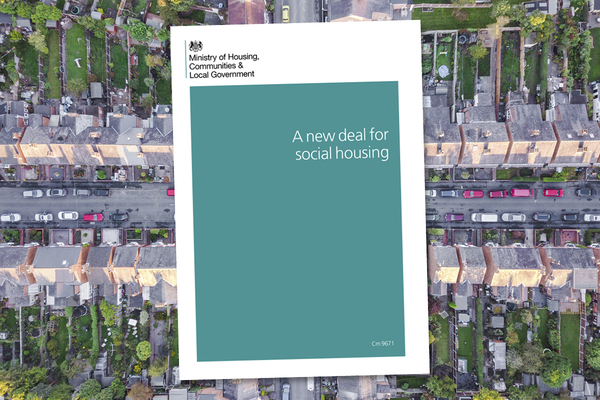You are viewing 1 of your 1 free articles

The Thinkhouse review of housing research: August
This month, Thinkhouse editorial member Peter Williams looks at two reports which highlight the technical complexities of fixing the housing crisis
Thinkhouse is a new website set up to be repository of housing research. Its editorial panel of economists, chief executives, consultants and academics critiques collates the best of the most recent housing research (scroll down for more information).
I decided to look at two reports, What Lies Beneath – how to fix the broken land system at the heart of our housing crisis, by the New Economics Foundation (NEF) and Sustainability of Right to Buy – summary report, by the Local Government Association (LGA).
The land market is a neglected topic when it comes to housing policy debate. It is implicit in the constant debate on planning and housing supply but it has rarely been at the centre of the analysis.
The Office of Fair Trading reviewed the market in 2008, and separately Paul Cheshire and Laurie Macfarlane have written extensively on it – the latter has just published a review for the Scottish Land Commission.
“The land market is a neglected topic when it comes to housing policy debate.”
Mr Macfarlane was previously at the NEF which produced the What Lies Beneath report. At times this report does feel like a bit of a polemic but they have drawn together references and research and it provides a useful run through of the issues.
The NEF suggests England should set up a land commission like Scotland and that the rather non-transparent viability test used by developers should be reviewed alongside a revisit of land value taxation and the setting up of a land bank.
The NEF rightly flags up the paucity of good data reminding us that the government scrapped the series produced by the Valuation Office Agency in 2010.
The paper doesn’t really reflect on the impact of its proposed measures which would be hard fought over. However, let’s not forget the Westminster government has promised a consultation on land value uplift.
The LGA report with Savills is on the equally hot topic of the Right to Buy (RTB).
Clearly this was written in advance of the government’s recent announcements in the Social Housing Green Paper – eg local authorities will no longer pay a levy on vacant higher-value council homes and fixed-term tenancies will no longer be mandatory for new council tenants. (In addition, note the consequence of the non-implementation of the forced sales levy means that there is no source of funding for one possible policy that remains – the extension of the Right to Buy to housing association tenants).
The report examines the complex rules around local authority RTB receipts, borrowing caps and the number of homes that can be built.
The analysis suggests that assuming the availability of borrowing to the cap, and without changes to any other factors within the agreements, there is the potential to provide around 39,000 new affordable homes over a five-year period, even though this would still mean a net loss of around 22,000 social homes over that time.
Strikingly 52% of the total 141 receipts arising over that period (£1.5bn) would be sent to central government.
The paper suggests that the lifting of debt caps must be a pre-requisite to achieving a one-for-one replacement programme at the national level. The Social Housing Green paper did not go as far as the paper suggests but the government has increased the borrowing cap by £1bn which local authorities can bid for.
“It is quite clear that a bigger local authority role is an essential pre-requisite for boosting housing supply to the levels needed.”
The LGA papers offers up a number of other suggestions as to how local authorities can play a bigger role but to date there are no further signs of movement.
It is quite clear that a bigger local authority role is an essential pre-requisite for really boosting housing supply to the levels needed but the old ideological anti-council housing stance remains inside the government and the party – and despite the rhetoric of the green paper.
The LGA paper provides a useful technical extension of the debates around the Right to Buy nailing down some of the very practical impediments that remain. This is an agenda that deserves much greater attention from both analysts and government.
These are two very different contributions but both lift the lid on neglected issues, and ones which highlight the technical complexities of getting to grips with housing issues.
Peter Williams, researcher and departmental fellow, department of land economy, University of Cambridge
2018 Early Career Researcher's Prize
Submissions are invited to our early career researcher's prize (sponsored by Altair)
This award will give early career housing researchers an opportunity to showcase their work to a wide and influential audience.
Please click here to download the entry criteria and requirements. The closing date is the 28 September 2018.
The aim of this newly established competition is to encourage papers that look at international research or which help to close the evidence gaps highlighted in our 2017 annual review. However we will not necessary preclude papers (subject to prior agreement) that look at other housing related issues or research gaps.
The competition is open to those with up to six years research experience.
Candidates with or without a PhD, and those working within academic or non-academic institutions (the voluntary sector, think tanks, membership organisations, the media, housing associations etc) are welcome to apply. Please note that time spent in doctoral-level research study counts as research experience.
Co-authored papers are permitted in cases where all authors meet the entry requirements.
We will consider think pieces, review papers synthesising existing evidence and policy analysis, papers sharing the findings of original empirical research or investigative journalism type pieces. Journal articles or other papers already published or under review will be accepted
Gemma Duggan, head of compliance and improvement, Extracare Charitable Trust and editorial panel member, Thinkhouse
What is Thinkhouse?
Thinkhouse was formally launched in spring 2018, and aims to “provide a single location and summary of the best and most innovative research pieces, policy publications and case studies”.
It specifically looks at reports that propose ways to boost the amount and quality of housing and the economic, social and community issues of not doing this.
The Thinkhouse editorial panel highlights the ‘must-read’ reports, blogs about them and runs the annual Early Career Researcher’s Prize.
The panel includes current and former housing association chief executives, academics, lawyers, economists and consultants. It is chaired by Richard Hyde, chief executive of a business that sells construction hand tools.
Who is on the panel?
Richard Hyde | Chair of Editorial Panel, CEO of HYDE |
Gemma Duggan | Head of Compliance and Performance at Extracare |
Chris Walker | Economist |
Brendan Sarsfield | CEO, Peabody |
Mick Laverty | CEO, Extracare Charitable Trust |
Martin Wheatley | Senior Fellow, Institute for Government, |
Kerri Farnsworth | Founder & MD, Kerri Farnsworth Associates |
Suzanne Benson | Head of Real Estate for the Manchester office of Trowers. |
Burcu Borysik | Policy Manager at Revolving Doors Agency, |
Ken Gibb | Professor in housing economics at the University of Glasgow, Director of CaCHE |
Peter Williams | Departmental Fellow, Department of Land Economy, University of Cambridge |
Brian Robson | Executive Director of Policy and Public Affairs at the Northern Housing Consortium |
Francesca Albanese | Head of Research and Evaluation at Crisis |
Jules Birch | Journalist and blogger |
Susan Emmett | Head of Engagement for Homes England |
Mark Farmer | Founder and CEO Cast Consultancy |
Steve Moseley | Group Director of Governance, Strategy & Communications at L&Q |
Jennifer Rolison | Head of marketing at Aquila Services Group |
Philip Brown | Professor of Housing and Communities at the University of Huddersfield |
Anya Martin | Senior researcher at the National Housing Federation |
Emily Pumford | Policy & strategy advisor, Riverside |
Anthony Breach | Analyst, Centre for Cities |
Shahina Begum | Customer Insight Office, Peabody |













